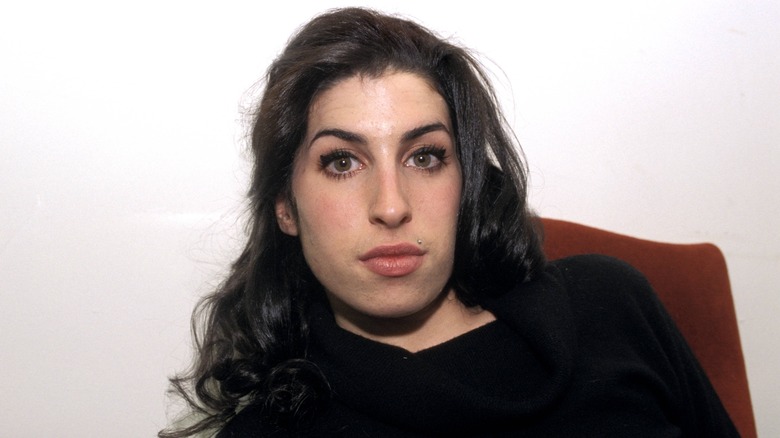What Amy Winehouse's Brother Alex Really Blames For Her Tragic Death
The following article includes mentions of substance abuse, disordered eating, and depression.
Amy Winehouse's life came to a tragic end in July 2011. The Grammy award-winning singer, who released hits like "Rehab" and "You Know I'm No Good," was only 27 years old when she suddenly died. Amy's cause of death was alcohol toxicity, as she had consumed more than five times the legal drink-drive limit, per BBC. Coroner Shirley Radcliffe stated that it was "a level of alcohol commonly associated with fatality."
Leading up to Amy's death, the star battled substance abuse for years. According to The Florida Times-Union, she binged on booze and used heroin and crack cocaine. However, there appeared to be a light at the end of the tunnel, as Amy began to face her addiction head-on. In a 2021 article for the Independent, Amy's stepmother, Jane Winehouse, expressed her hopefulness for the singer. She said, "Towards the end, the gaps — the periods of sobriety — were getting longer. We thought she was going to pull through. We thought she was going to beat it."
Yet, after being sober for nearly two weeks, Amy began drinking just a few days before she died. Sadly, substance abuse wasn't the only problem she struggled with. In fact, Amy's brother, Alex Winehouse, actually believed something else contributed to her death.
If you or anyone you know needs help with addiction issues, help is available. Visit the Substance Abuse and Mental Health Services Administration website or contact SAMHSA's National Helpline at 1-800-662-HELP (4357).
Alex Winehouse talked about Amy Winehouse's bulimia
In 2013, Amy Winehouse's brother Alex Winehouse spoke to the Observer (via E! News) about her battle with bulimia. Alex shared, "We all knew she was doing it, but it's almost impossible [to tackle] especially if you're not talking about it. It's a real dark, dark issue." He noted that her struggles were no secret. He added, "She would have died eventually, the way she was going, but what really killed her was the bulimia... Absolutely terrible." He explained that her eating disorder significantly weakened her health.
As reported by the Mirror, author Ian Halperin shared some alarming details about Amy's final days. In his book, he wrote, "She was living on fumes in those final weeks, she was rail thin and was existing on cigarettes and beverages; and when I saw beverages it wasn't H2O."
In 2014, Amy's friend Naomi Parry talked to Cosmopolitan about the late singer's eating disorders, which also included restricting her food intake. She gave some insight into the origins of her struggles, saying, "I think Amy started to lose control in other aspects of her life, which led her to control her eating instead." When Parry lived with Amy, she was supportive but not pushy, gently encouraging her friend to eat healthy, nourishing meals. Perry ended up writing Amy a letter addressing her concerns and displaying her support. She noted that it caused a brief shift in her friend.
If you need help with an eating disorder, or know someone who does, help is available. Visit the National Eating Disorders Association website or contact NEDA's Live Helpline at 1-800-931-2237. You can also receive 24/7 Crisis Support via text (send NEDA to 741-741).
Amy Winehouse struggled with depression
While Amy Winehouse never made a full recovery, her loved ones encouraged her to get treatment for her struggles. That was the crux of her song "Rehab," she noted, per ABC News. In an interview on "The Album Chart Show," she said, "I just felt, no. Do they have a gym there? Who's going to feed my cats? Alcoholism is a horrible thing, but if you can't remember the practical issues, that's when you know you've got a real problem." However, Winehouse was well-aware of the roots of her issues. She shared, "I do drink a lot. I think it's symptomatic of my depression. I'm manic depressive, I'm not an alcoholic, which sounds like an alcoholic in denial."
The 2015 documentary "Amy" shed more light on Winehouse's mental health troubles and childhood. In a clip (via The Fader), she noted that while she didn't know about depression, she felt like something was off. Winehouse then described how making art was therapeutic. She explained, "I think it's a musician thing, that's why I write music. But I'm not like, some messed up person. There's a lot of people that suffer depression that don't have an outlet."
If you or someone you know needs help with mental health, please contact the Crisis Text Line by texting HOME to 741741, call the National Alliance on Mental Illness helpline at 1-800-950-NAMI (6264), or visit the National Institute of Mental Health website.



